Women Rock Berklee

Siedah Garrett
Photo by Phil Farnsworth
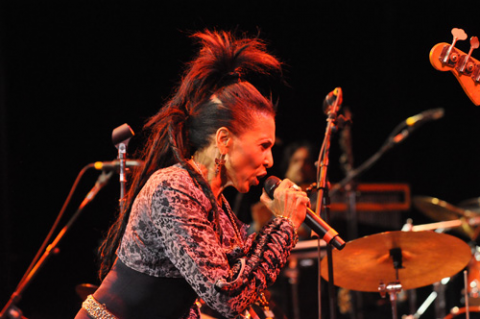
Nona Hendryx
Photo by Phil Farnsworth
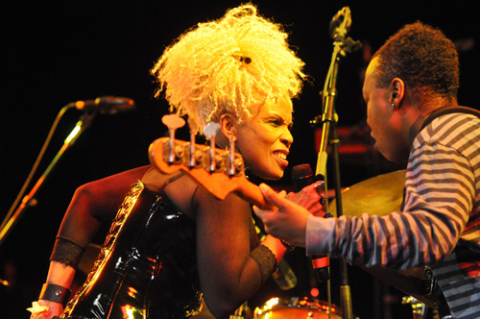
Joyce Kennedy and Meshell Ndegeocello
Photo by Phil Farnsworth

Cindy Blackman
Photo by Phil Farnsworth
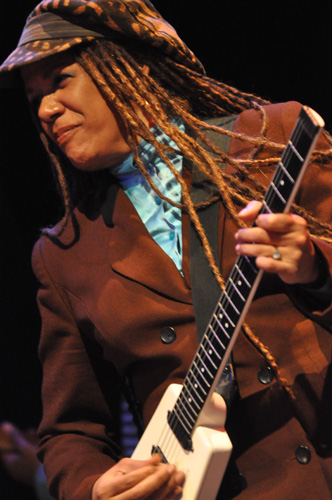
Felicia Collins
Photo by Phil Farnsworth
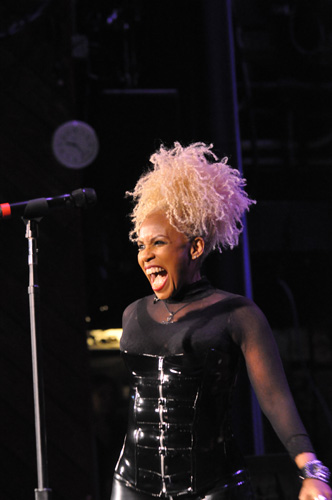
Joyce Kennedy
Photo by Phil Farnsworth
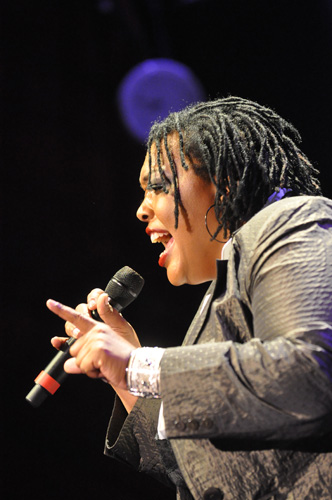
Kudisan Kai
Photo by Phil Farnsworth
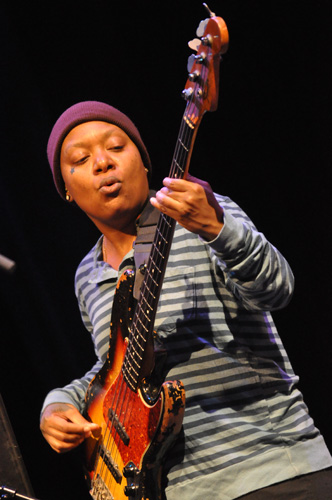
Meshell Ndegeocello
Photo by Phil Farnsworth
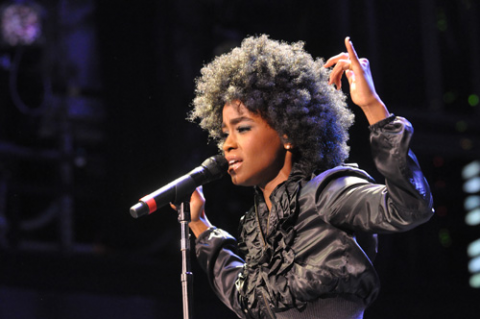
Shea Rose
Photo by Phil Farnsworth
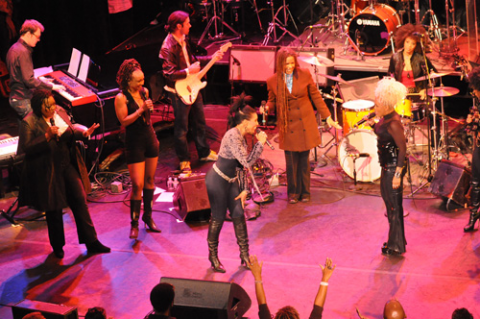
Women in Rock finale
Photo by Phil Farnsworth
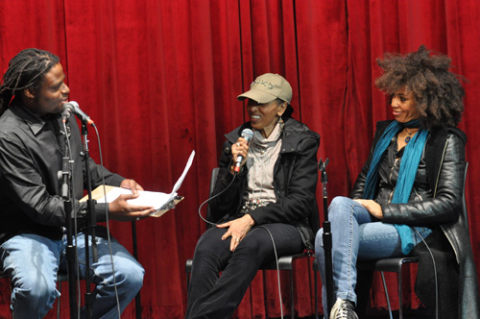
Tony Brown interviews Nona Hendryx and Cindy Blackman
Photo by Phil Farnsworth
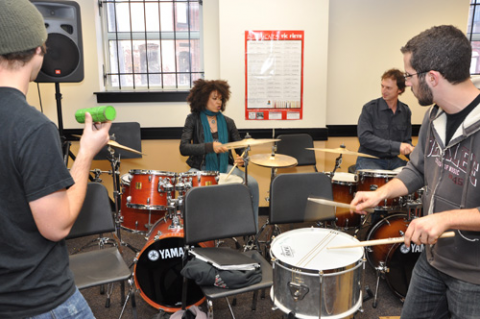
Cindy Blackman jams with Mark Walker, right, and his students.
Photo by Phil Farnsworth
The Women in Rock residency brought to the forefront an underrepresented group of musicians: African American female rockers.
Kudisan Kai, associate professor in the Voice Department, drew from the network of women she's shared the stage with and knows through the business to pull together an impressive list of performers who visited classrooms, sat in on a panel discussion, gave an interview to the Berklee Internet Radio Network, and rocked the house at a culminating show in the Berklee Performance Center.
For Kai, it was the realization of the question: What if I get everyone I know and love together?
The week-long celebration also served to raise awareness. "African American women rockers do exist," Kai said, noting that she hopes this message will also resonate with those who want to pursue this path.
That point was not lost on the crowd at the BPC as it was treated to an all-star line-up, including Kai, drummer Cindy Blackman, vocalists Nona Hendryx and Joyce Kennedy, singer/songwriter Siedah Garrett, bass player Meshell Ndegeocello, guitarist Felicia Kennedy, and student band Shea Rose. Each musician shone on her own and as a group; the concert finale was a rousing rendition of Hendryx's "Rock This House," in which all the performers joined in and delivered exactly what the song title called for.
In the Classroom
Over the week-long residency, the musicians visited classrooms across campus, showing their stuff and doling out career advice. Here is a sample of what transpired:
Professor Mark Walker got the groove going in his South American Rhythms for Drum Set class by introducing students to samba instruments—from the caixa to agogô bells. Once the students got a samba beat going, Walker invited powerhouse drummer Cindy Blackman, who was sitting in on the class. She accepted Walker's invitation to join the impromptu ensemble and wowed everyone with her amazing chops.
For Blackman '80, being back at Berklee was nostalgic. "It's really cool to be back on campus," she said after the class. "The Berklee experience has changed so much since I went here. It was great then, but more is offered now. . . . There's more of a chance for students to really focus and hone in on their music."
As for jamming with the students, Blackman—whose impressive résumé includes a 14-year stint with Lenny Kravitz and worldwide gigs with her own group, as well as performances with Ron Carter, Buckethead, Prince, and Mick Jagger—said she had a great time. "It kinds of takes me back," she said.
Siedah Garrett—whose career skyrocketed when she cowrote "Man in the Mirror" with Glen Ballard for Michael Jackson and later toured with Jackson singing the duet "I Just Can't Stop Loving You"—paid a visit to Jack Perricone's Advanced Songwriting class.
She shared what she called "the most important kernel that any songwriter can have and use and learn from," courtesy of Quincy Jones '51: "The best songwriters are rewriters."
"I remember turning in song after song after song and Quincy would listen to these songs and say, 'I don't understand the story... What's happening?' Even though you think you've written a lyric or a melody, you've just got to keep relistening to it. There's always a way to hone it and make it just that much better."
Garrett talked about her experience cowriting "Man in the Mirror." "Quincy was just finishing up Michael's Bad album. He said, 'We need one more song, to sort of round out this album.'"
With that order, she got together with Ballard. Garrett found inspiration from a phrase—"Man in the Mirror"—she had overheard and recorded in her journal years earlier while writing a song with jazz pianist John Beasley. "I'm sitting in Glen's studio, flipping through my book as he's playing chords. I saw this phrase and I just started singing. I'm telling you, I couldn't write fast enough. I couldn't get the lyrics out fast enough. I was thinking faster than I could write. And at the end of that afternoon, we had the verse and the chorus to 'Man in the Mirror.' We knew it was something very exciting."
Indeed, that song would soon be heard around the world. "When you're in a soccer field in Europe and the whole field has Bic lighters and everybody's waving them and singing 'Man in the Mirror,' that's the most exhilarating feeling you'll ever have as a songwriter. I wish that for every one of you," said Garrett, who recently met with another huge success with an Academy Award nomination and Grammy Award for Dreamgirls' "Love You I Do."
The BIRN
Tony Brown, assistant to the dean for the Music Technology Division, sat down with Cindy Blackman and Nona Hendryx for an interview for the BIRN. The following are excerpts from that conversation:
Brown: You have had to overcome some external prejudices, including being an African musician that primarily plays in the rock genre.
Blackman: I've heard, as I'm sure many other women have, 'Oh, a little girl shouldn't play drums. You should play flute or violin.' That kind of stuff that I heard, yes, it did hurt me as a kid. I cried over that. But then I would go home and get back my drums and realize those people meant absolutely nothing in terms of how I felt about playing my instrument, about playing music and expressing music through that way. When I was 13, LaBelle was one of the first groups I saw. . . . I was completely enthralled. I didn't look at LaBelle as a girl group, I just looked at LaBelle as a slammin' group that had three singers who were killin' and workin' it all the way. . . . I understand people on the outside look at things that way [as girl group] and it really is an expression of who we are as a race, the human race. When we have to ask ourselves: Are we ready for a girl on drums? What a question. Are we ready for a black president? What a question. Why do we still have to ask that? . . . Through some things that are happening, especially this year, speaking of politics, that will hopefully take us to another level and lessen the time that we are still asking those ridiculous questions.
Hendryx: I remember traveling down South, being refused entrance into restaurants, hotels, having people actually lift weapons to have us removed from a place. . . . It's a pretty big challenge to begin with. That puts steel in your spine when you deal with things like that. That was the racism in the country. Then you have sexism on top of that. If you're not willing to use whatever feminine wiles or charms or looks you have in a way that is expected of you to use them to get what you want, then you're not accepted by some people. You're limited in your opportunities or how far you can go.
Brown: What's your view on what's going on now in the music industry?
Hendryx: What's happened to the music industry is what happened to the stock market, the housing market, the whole internet bubble. . . . Everything was overhyped, overpriced, oversold. Something comes along like the internet and just exposes all of the over, over everything. . . . I think the internet and the ability for artists to get their music directly to people has been a gift to some and nightmare to others. . . . It has changed the landscape. The industry will never be the same. . . . And people have learned in retrospect that it is always still about the music in the end.
